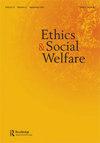行走,交谈,想象:与性工作者的道德接触
IF 0.9
Q4 SOCIAL WORK
引用次数: 0
摘要
摘要本文描述了对一位性工作者的步行采访,这位性工作者是爱尔兰性工作者权利的倡导者。行走访谈被认为是一种传记方法,可用于探索个人关注和公共问题之间的关系,该方法的特点是流动、关系和具体实践(O'Neill和Roberts[2019。走路方法:对动作的研究。伦敦:Routledge])。与研究参与者同行解决了采访中固有的权力失衡问题,通过允许共享视角和共享感官体验,努力实现道德实践。我们一起调查性工作研究、结盟和教育的伦理,并考虑如何加强性工作和非性工作女权主义者之间的联盟。考虑了性工作者获得社会正义的机会,并提出了一个激进的民主设想,即性工作者被赋予包容性社会的完全公民身份。这一设想是根据奥尼尔的工作【2010年】。“文化犯罪学和性工作:通过激进民主和参与性行动研究抵制监管标准杆数”,《法律与社会杂志》37(1):210–232],O'Neill和Seal[2012。越轨想象:犯罪、邪恶与文化。伦敦:Palgrave Macmillan]和FitzGerald、O'Neill和Wylie[2020b。“性工作者的社会正义是一种‘行为的政治’:研究、政策和实践。”《爱尔兰社会学杂志》28(3):257–279],他们设想性工作者充分参与公民、政治和社会领域。从对彼此的彻底开放和接受,以及对所有人的身体自主和社会正义的坚定奉献开始,我们提出了一条通往这个想象中的社会的道路。本文章由计算机程序翻译,如有差异,请以英文原文为准。
Walking, Talking, Imagining: Ethical Engagement with Sex Workers
ABSTRACT This article describes a walking interview with a sex worker who is an advocate for sex worker rights in Ireland. Walking interviews have been proposed as a biographical method which can be used to explore the relationship between personal concerns and public questions, and the method is characterised by mobile, relational and embodied practice (O’Neill and Roberts [2019. Walking Methods: Research on the Move. London: Routledge]). Walking with research participants addresses the power imbalances inherent in interviews, striving for ethical praxis, by allowing a shared perspective and a shared sensory experience. Together we investigate the ethics of sex work research, allyship and education, and we consider ways to strengthen alliances between sex working and non-sex working feminists. Opportunities for social justice for sex workers are considered, and a radical democratic imaginary is proposed, where sex workers are afforded full citizenship of an inclusive society. This imaginary follows work by O’Neill [2010. “Cultural Criminology and Sex Work: Resisting Regulation Through Radical Democracy and Participatory Action Research PAR.” Journal of Law and Society 37 (1): 210–232], O’Neill and Seal [2012. Transgressive Imaginations: Crime, Deviance and Culture. London: Palgrave Macmillan] and FitzGerald, O’Neill, and Wylie [2020b. “Social Justice for Sex Workers as a ‘Politics of Doing’: Research, Policy and Practice.” Irish Journal of Sociology 28 (3): 257–279], who have imagined full participation for sex workers in civic, political and social spheres. Starting with a radical openness to and acceptance of each other, as well as a firm dedication to bodily autonomy and social justice for all, we propose a path towards this imagined society.
求助全文
通过发布文献求助,成功后即可免费获取论文全文。
去求助
来源期刊

Ethics and Social Welfare
SOCIAL WORK-
CiteScore
1.60
自引率
20.00%
发文量
36
期刊介绍:
Ethics and Social Welfare publishes articles of a critical and reflective nature concerned with the ethical issues surrounding social welfare practice and policy. It has a particular focus on social work (including practice with individuals, families and small groups), social care, youth and community work and related professions. The aim of the journal is to encourage dialogue and debate across social, intercultural and international boundaries on the serious ethical issues relating to professional interventions into social life. Through this we hope to contribute towards deepening understandings and further ethical practice in the field of social welfare. The journal welcomes material in a variety of formats, including high quality peer-reviewed academic papers, reflections, debates and commentaries on policy and practice, book reviews and review articles. We actively encourage a diverse range of contributions from academic and field practitioners, voluntary workers, service users, carers and people bringing the perspectives of oppressed groups. Contributions might include reports on research studies on the influence of values and ethics in social welfare practice, education and organisational structures, theoretical papers discussing the evolution of social welfare values and ethics, linked to contemporary philosophical, social and ethical thought, accounts of ethical issues, problems and dilemmas in practice, and reflections on the ethics and values of policy and organisational development. The journal aims for the highest standards in its published material. All material submitted to the journal is subject to a process of assessment and evaluation through the Editors and through peer review.
 求助内容:
求助内容: 应助结果提醒方式:
应助结果提醒方式:


